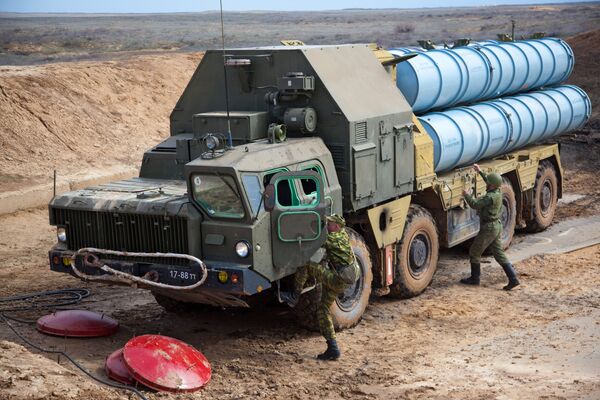Failing to receive the promised Russian S-300 air defense systems, Iran has filed a lawsuit against Russia in the hope of enforcing the contract that was canceled in 2010. But Tehran's chances of getting anything out of it are slim.
Iran is determined to get Russia to fulfill its contract for the delivery of S-300 systems via a legal battle. "We have said and claimed from the beginning that S-300 deliveries to Iran are not subject to UN Security Council Resolution 1929," the Iranian ambassador to Russia, Mahmoud-Reza Sajjadi, said at a news conference at RIA Novosti on Wednesday. "Tehran filed a claim with the International Arbitration Court almost six months ago," he said. In Sajjadi's opinion this will help Russia fulfill its contractual obligations by giving it a "legal trump card."
Business that failed
Nevertheless, the lawsuit is not likely to result in anything tangible. Iran's attempts to get the contract fulfilled through a court action (and "help" Russia follow through on the sale) will flounder on a very simple detail: no one technically stopped the deal; it was simply shelved by the Russian president's decree on joining the sanctions against Tehran.
In the fall of 2010, Russia officially refused to supply a range of armaments to Iran under UN Security Council Resolution 1929, adding S-300 defense systems to the list. However, in the summer of 2010 the United States acknowledged that the system did not fall under the UN resolution but still strongly urged Russia to give up the deal.
As a result, a contract to deliver five equipment sets for five air defense missile battalions worth $800 million was not just frozen, but openly rescinded.
This sales saga has been dragging on since 2007. The concluded deal at once came under pressure from many "outside players" who were interested in seeing that Tehran would not obtain these weapons. The upshot has been that Iran has not received any S-300s, although some unconfirmed reports say the Iranian military got a few outdated systems at the beginning of the 1990s. There is no confirmation of this assertion, but those models are old enough that they are unlikely to be battle worthy at this point.
The air defense systems from the annulled contract belong to the S-300PMU-1 type developed by the Almaz Research and Production Association. This is an export modification of Russia's S-300PM and not a very advanced one. There is also the S-300PMU-2 Favorit, which has been supplied to other countries, including China and Algeria. It is equipped with a new radar system and uses a modified 48N6E2 missile, which is far more effective against tactical ballistic missiles than its forerunners.
The lost revenue from the shelved deal is substantial. On top of the unrealized revenue of $800 million there is a $400 million penalty which Russia must pay for unilaterally breaking the contract. Its image has also been dented: third world countries are very sensitive to political developments on the global arms market.
Foggy prospects
The best Iran can hope for is to get back the pre-payments it made by quoting force-majeure circumstances. But, given the circumstances, no one will grudge Iran this money. The penalty, however, will be a harder nut to crack: Iran will have to demand payment of the fine, not fulfillment of the contract, through a court.
Tehran is unlikely to obtain anything with this action. This might be a simple PR move without any real content to show that Iran's top leadership is displeased with Moscow.
The move has little chance of producing the desired result: the decision appears to be final. The Rosoboronexport agency's standard response is that S-300 deliveries could resume as soon as the ban is lifted.
The views expressed in this article are the author's and do not necessarily represent those of RIA Novosti.



